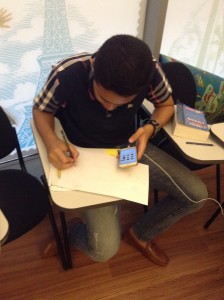 by Hana Tichá
by Hana Tichá
As a mother of three boisterous youngsters (two of them in their late teens), I can attest to the fact that adolescence is probably the most critical period of human development. Generally, teenagers are considered to be moody, impulsive and self-centred. They are seen as technology addicts constantly tapping their smartphone screens. Headphones, once defined as a hardware device, are now officially part of a teenage body, the same as ears, eyes or hands. What’s even worse, teenagers behave like totally carefree creatures who don’t care a toss about school.
Why on earth would one want to get involved in teaching teenagers then?
Well, teaching teens is my everyday reality; I teach English to groups of learners aged 13-19 and I have done so for many years now. Over time, I have gained a decent amount of experience and collected enough data to fall into the trap of seeing myself as an expert on the Teaching Teens Issue. So, I might easily feel tempted to start throwing my valuable insights at the reader now.
I won’t. Instead, I’m going to present the results of a little survey I conducted for the sake of this article. I asked some of my students what they think it is like for a teacher to teach teenagers these days. Apart from their answers, I’m sharing a couple of my random, spontaneous notes – thoughts and ideas that first sprang to mind while I was going through their responses.
What do you think it is like for a teacher to teach teenagers these days?
 Lucy (16): It’s very hard to teach teens because they are strange people. They say and do strange things because they think they know everything about the world and life. My note: There’s no reason to despair; their view of the world might be a great topic for conversation classes.
Lucy (16): It’s very hard to teach teens because they are strange people. They say and do strange things because they think they know everything about the world and life. My note: There’s no reason to despair; their view of the world might be a great topic for conversation classes.
Niki (16): It must be very difficult. We are tired most of the time because we have to wake up early. We’re bored and lazy. During the lessons, we talk to each other because we have a lot to say. But sometimes, when we are in a good mood, we’ve got some interesting ideas and we can be really nice and fun. Note: Why not turn their enthusiasm to our advantage? Let them converse about things they are genuinely interested in.
Veronika (16): When you teach teens, you should be careful about erotic puns and ambiguous meanings. Also, expecting someone to start focusing right in the morning is foolish. Note: It seems we’d better start creating an extensive bank of classroom warmers and icebreakers. Also, we should think twice before we introduce certain PARSNIP topics, i.e. taboo issues in English language teaching. Sometimes it might be safer to avoid some of them completely.
 Pavel (16): If I had to teach teenagers, I’d be angry all the time, especially if they didn’t pay attention. Note: We should remember that our students realize how hard teaching can be. This can help us build a good relationship with them.
Pavel (16): If I had to teach teenagers, I’d be angry all the time, especially if they didn’t pay attention. Note: We should remember that our students realize how hard teaching can be. This can help us build a good relationship with them.
Tom (16): Teaching teens must be fun because they are almost adults and so they make intelligent jokes. Note: This is what I love about teaching teens! It is so refreshing and energizing.
Anonymous (16): The biggest advantage is when the teacher has his/her own teenage kids. Note: I can’t but agree! However, sometimes I feel knowing less would be to the good.
Anonymous (19): The teachers have to deal with the fact that everything they do is seen as awkward. I think teachers are poor human beings! Note: It’s incredible how compassionate teenagers can be!
Anonymous (19): Teaching is like driving. Sometimes you make the right turn and the students pay attention and you are full of happiness. Then there are bad turns and the students are bored. Note: This metaphor only proves how exciting it is to teach young adults.
Anonymous (19): I appreciate today’s teachers. Note: So simple and telling. Teaching is worth the effort in the end.
Nikol (19): I think that teaching teenagers is like trying to force huge mountains to move. Note: Well, who says it’s easy?
As the teenage brain has not fully developed yet, it may sometimes be extremely difficult for us adults to understand what’s going on in those little heads. Despite the fact we were all once teenagers ourselves, it’s still hard for us to fully appreciate what it is like to be one these days. Nevertheless, I’m an optimist and I’m convinced that it all comes down to communication.
I believe that regardless of our prior assumptions the only way to discover how our students really feel is to ask them. And to get frank answers, we mustn’t be afraid to be open ourselves. I can’t see any reason for worrying about their potential reactions; the results of the survey make me hope that most of them will always be encouraging and pleasing, rather than rude or arrogant.



 by Pravita Indriati
by Pravita Indriati I remember during the first year of my teaching career there was a boy who came up to me and talked animatedly about his favorite band, showed me their CD that he’d brought from home. Nowadays it’s not only music they’re up-to-date with but also technology, and social media in particular is the top trend for their age. They keep talking about their Instagram accounts, bragging about their love of Minecraft, discussing their favorite YouTubers whose updates they always follow. If we could be teachers who know about these passions, can talk about them (or even teach!), our students would then think, “My teacher is cool!”
I remember during the first year of my teaching career there was a boy who came up to me and talked animatedly about his favorite band, showed me their CD that he’d brought from home. Nowadays it’s not only music they’re up-to-date with but also technology, and social media in particular is the top trend for their age. They keep talking about their Instagram accounts, bragging about their love of Minecraft, discussing their favorite YouTubers whose updates they always follow. If we could be teachers who know about these passions, can talk about them (or even teach!), our students would then think, “My teacher is cool!” There’s just no way to get them sit, listen, and write. Much like little kids, they have lots of energy and they’ll quickly get bored once they have to waste it at their desks. There have been classes when some of my students suddenly stood up from their chairs and moved around in the middle of my lesson! I realized that combining regular tasks with some kinesthetic activities is a good idea in a classroom full of teenagers. They love running dictation, racing games, scavenger hunt, or whatever activities get them moving while learning.
There’s just no way to get them sit, listen, and write. Much like little kids, they have lots of energy and they’ll quickly get bored once they have to waste it at their desks. There have been classes when some of my students suddenly stood up from their chairs and moved around in the middle of my lesson! I realized that combining regular tasks with some kinesthetic activities is a good idea in a classroom full of teenagers. They love running dictation, racing games, scavenger hunt, or whatever activities get them moving while learning.